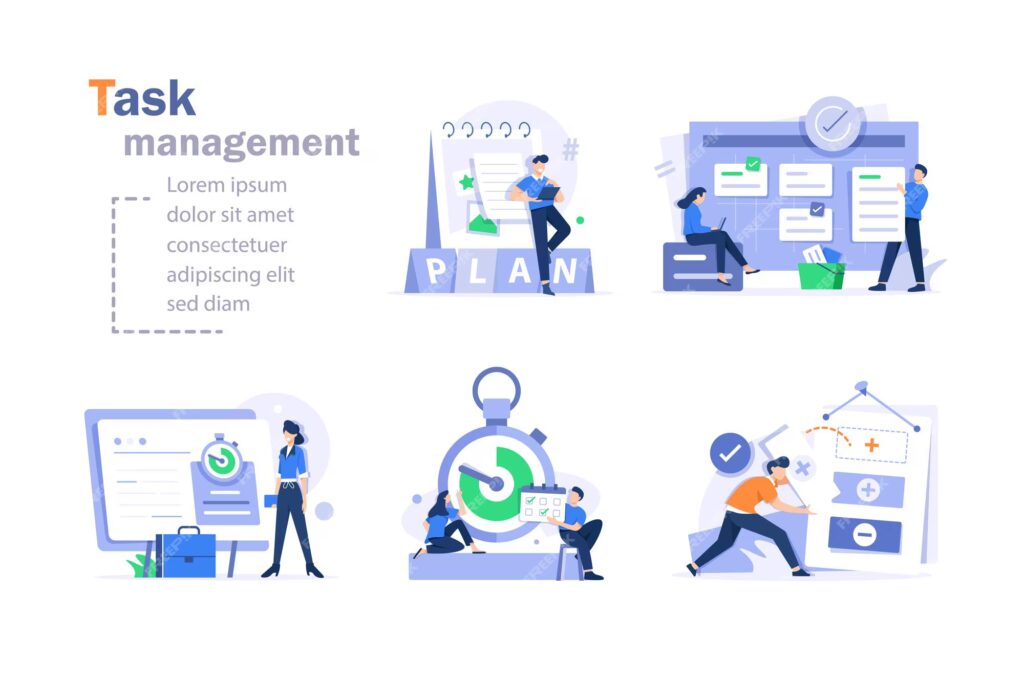
As an ICAG student, you’re constantly spinning plates—studying for grueling exams, attending classes, holding down a job, and squeezing in personal commitments. Tasks pile up faster than you can tackle them, and without a clear strategy, it’s easy to feel swamped. Prioritizing tasks is your lifeline to staying focused, crushing your exams, and building a stellar career as a Chartered Accountant. This article dives deep into practical, no-nonsense strategies to help you sort your to-do list like a pro, ensuring you zero in on what matters most. For a broader roadmap to thriving in your ICAG journey, check out Success Strategies for ICAG Students, which covers everything from time management to soft skills, giving you a holistic guide to acing your studies and beyond.
Identify High-Impact Tasks
When your to-do list feels like a mile-long scroll, not all tasks are created equal. Some pack a bigger punch for your ICAG exams and career goals, and spotting these high-impact tasks is your first step to working smarter, not harder.
Focus on Core Subjects
ICAG exams are no walk in the park, and subjects like Financial Reporting, Audit, and Taxation carry serious weight. These are your heavy hitters—mastering them can make or break your scores. Dedicate prime study hours to these areas, especially if you’re prepping for papers like Financial Accounting or Assurance. For instance, nailing double-entry bookkeeping early sets you up to tackle complex financial statements with ease.
Practice Past Papers
If you want to know what’s coming in an exam, past papers are your crystal ball. They reveal question patterns, highlight recurring topics, and sharpen your exam technique. Set aside time each week to work through at least one past paper under timed conditions. This isn’t just busywork—it’s a high-impact task that builds confidence and exposes gaps in your knowledge. Pro tip: ICAG’s online resources often include past papers and marking schemes—grab them!

Tackle Urgent Deadlines
Some tasks scream for attention, like submitting assignments or registering for ICAG seminars. Missing these deadlines can derail your progress, so they’re non-negotiable. Keep a running list of due dates—whether it’s for coursework, exam fees, or professional events—and check it daily. Better yet, set reminders on your phone or use a tool like Google Calendar to stay ahead of the game.
Use a Prioritization Framework
Staring at a mountain of tasks can leave you paralyzed. A prioritization framework is like a map—it helps you navigate the chaos and decide what to tackle first. Two tried-and-true methods stand out: the Eisenhower Matrix and the ABC system.
The Eisenhower Matrix
This framework sorts tasks into four buckets based on urgency and importance:
- Urgent and Important: These are your do-now tasks, like revising for an exam that’s a week away. Clear your schedule and dive in.
- Important but Not Urgent: Schedule these for later, like studying Financial Management concepts that’ll pay off in the long run. Block out time in your planner to chip away at them.
- Urgent but Less Important: Minimize or delegate these, like responding to routine emails. Can you batch them into a 15-minute window?
- Neither Urgent nor Important: Ditch these outright—think scrolling social media or binge-watching a new series. They’re time-suckers that steal focus from your goals.
The beauty of the Eisenhower Matrix? It forces you to think critically about what deserves your energy. Grab a notebook, draw a 2×2 grid, and start sorting your tasks. You’ll be amazed at how much clearer your priorities become.
The ABC Prioritization System
If the Eisenhower Matrix feels too fancy, try the ABC system—simple but effective. Label your tasks as:
- A Tasks: Must-do, high-priority, like finishing a mock exam before a study group session.
- B Tasks: Should-do, medium-priority, like attending a webinar on Ghana’s tax laws.
- C Tasks: Nice-to-do, low-priority, like color-coding your study notes for aesthetic vibes.
Each day, aim to knock out all A tasks before touching B or C. This keeps you laser-focused on what moves the needle. Apps like Todoist or a plain old sticky note can help you track these categories.
Assess Time and Resources
Prioritizing tasks isn’t just about what to do—it’s about when and how. You’ve got limited hours in a day, so matching tasks to your time and resources is key to getting things done without burning out.
Break Down Complex Topics
Some ICAG topics, like IFRS standards or corporate taxation, can feel like wading through quicksand. Break them into bite-sized chunks to make them manageable. For example, instead of “Study IFRS,” plan “Review IFRS 15 on Revenue Recognition for 45 minutes.” Smaller tasks feel less daunting and fit neatly into short study windows, like a lunch break or commute.
Reserve Peak Focus Hours
We all have times when our brain’s firing on all cylinders—maybe you’re a morning person or a night owl. Reserve these peak focus hours for high-priority tasks, like solving Audit practice questions or revising Taxation case studies. Save low-energy tasks, like organizing your study materials, for when you’re less sharp. If mornings are your jam, block out 7–9 AM for deep work and guard that time like it’s gold.
Use Task Management Tools
Paper planners are great, but digital tools can take your task management to the next level. Apps like Trello let you create boards for each subject, with cards for specific tasks (e.g., “Complete 10 Financial Reporting questions”). Notion is another gem for organizing study schedules and tracking deadlines. If you’re old-school, a bullet journal works just as well—just keep it updated. These tools help you visualize your workload and stay on top of what’s due.
Review and Adjust Daily
Priorities shift faster than you can say “balance sheet.” A task that’s critical today might take a backseat tomorrow, so reviewing and adjusting your list daily keeps you agile and in control.
Reassess Based on Progress
At the start or end of each day, take 10 minutes to scan your task list. Did you struggle with a Taxation concept? Bump it to tomorrow’s A-list. Got a new assignment deadline? Shuffle your schedule to fit it in. This isn’t about overthinking—it’s about staying responsive to your needs and deadlines. A quick review ensures you’re not wasting time on outdated priorities.
Celebrate Small Wins
Checking off tasks, even small ones, feels like a victory lap. Finished a set of past paper questions? Treat yourself to a coffee or a quick stretch. These micro-rewards keep you motivated and remind you that progress adds up. Keep a “done” list alongside your to-do list to track your wins—it’s a morale booster when the ICAG grind feels endless.
Stay Flexible
Life loves throwing curveballs—a work emergency, a family event, or even a sudden ICAG webinar announcement. When these hit, don’t cling to your original plan like it’s set in stone. Reprioritize without guilt. Maybe you push a B-task (like attending a study group) to next week to focus on an urgent A-task (like exam revision). Flexibility is your superpower—it keeps you sane and on track.
Minimize Distractions

High-priority tasks demand your full attention, but distractions lurk everywhere—your phone pinging, a noisy roommate, or the siren call of Netflix. Minimizing these is non-negotiable if you want to stay in the zone.
Set Specific Study Goals
Vague tasks like “Study Audit” are a recipe for procrastination. Instead, set crystal-clear goals: “Complete 10 Audit questions in 1 hour.” Specific goals give you a finish line, making it easier to dive in and stay focused. Write them down or pop them into your task app to keep them front and center.
Create a Distraction-Free Zone
Your study space should be a fortress of focus. Silence your phone or use apps like Forest to lock it down during study sessions. If you’re at home, let your family or roommates know when you need quiet time. A tidy desk with just your ICAG materials, a notebook, and water bottle cuts visual clutter, helping your brain zero in on the task at hand.
Use the Pomodoro Technique
The Pomodoro Technique is a game-changer for tackling tough tasks. Work for 25 minutes, then take a 5-minute break. Repeat four times, then take a longer 15–30-minute break. This keeps your brain fresh and prevents burnout. Use a timer app like Focus Booster or just your phone’s clock. It’s perfect for powering through practice questions or revising complex topics like IFRS without feeling overwhelmed.
Wrapping It Up

Prioritizing tasks as an ICAG student isn’t just about checking boxes—it’s about steering your energy toward what’ll propel you to exam success and a thriving career. By zeroing in on high-impact tasks, using frameworks like the Eisenhower Matrix or ABC system, assessing your time and resources, reviewing daily, and shutting out distractions, you’ll transform your to-do list from a stressor into a roadmap. The ICAG journey is tough, but with these strategies, you’re not just surviving—you’re thriving.
Ready to take control? Grab a pen, list your tasks, and start prioritizing like a pro. For more tips on crushing your ICAG studies, visit Knowsia to dive into their comprehensive guide. What’s your top task for today? Share it with fellow ICAG students at the next seminar and keep the momentum going!
